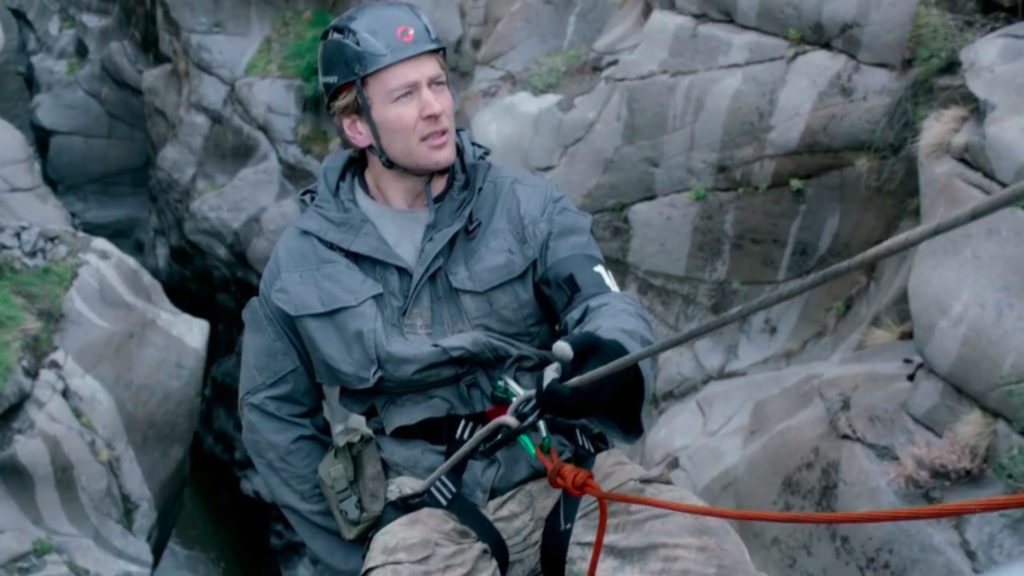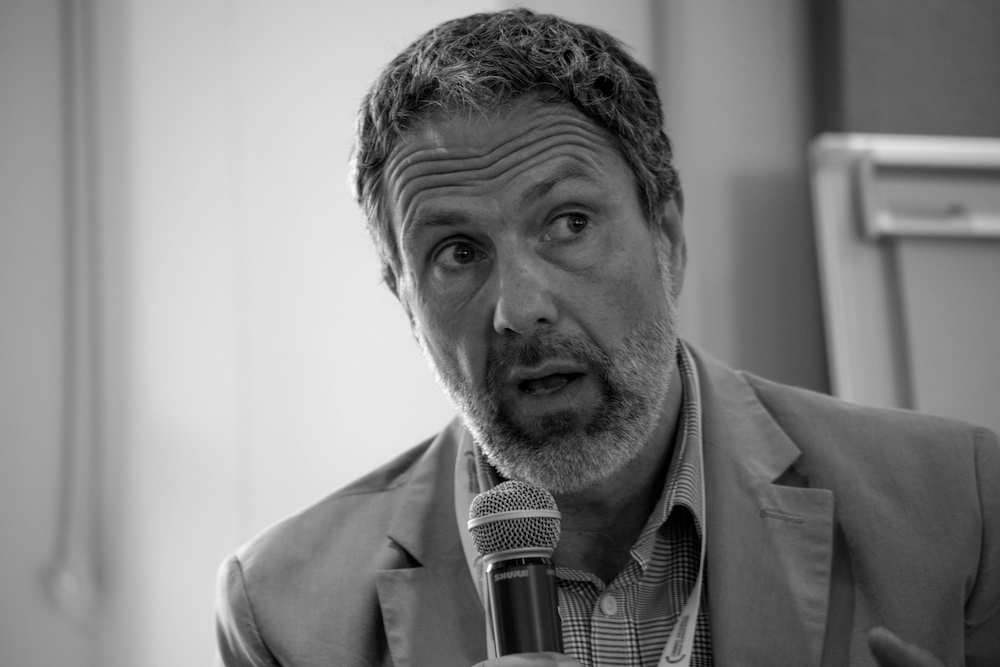9 February 2013 marked a turning point in the life of semi-pro rugby player James Gwinnett.
Playing National League rugby on that fateful Saturday, the imposing second rower launched himself into a tackle, as he’d done a thousand times before. On this occasion, though, a sudden change of direction by the opponent meant James’ neck was badly impacted in the collision.
He shook off the injury but, as the pain grew over the next two days, he marched himself into his local A&E. A CT scan revealed the true extent of his injury; a fracture to his C6 vertebra. James had broken his neck.
But it wasn’t the physical trauma to his body that left an indelible mark, it was the mental repercussions; James suffered through three years of depression and alcoholism. Eventually finding redemption in fitness, he’s now four years sober and taking on increasingly extreme endurance challenges.
We sat down with James and his colleagues at start-up 87%, which is changing how we measure mental health, to discuss these experiences, as well as the stigma that frustratingly still surrounds the subject.
James, you have been on an incredible journey – what have your own experiences been of mental health?
I didn’t realise the impact my injury had on me at the time, but it stripped me of my identity. There’s a bravado that comes with the game of rugby, and I used to enjoy the camaraderie and associated drinking culture.
That changed after I broke my neck. I no longer saw myself as a macho rugby player; I saw myself as frail, as a failure even, and I lost the motivation to be fit and healthy. My drinking became more habitual and I spiralled into alcoholism and depression. Fortunately, I was drawn into the notion of running the London Marathon and a training regime gave me the discipline to get and stay sober.

Amazingly, despite all the abuse I’d put my body through, I crossed the finish line in under four hours. It set in motion a fascination with pushing myself further and further and learning to harness the power of the mind to extend what we perceive as our limits.
How did you go from struggling with mental ill health to running ultramarathons?
Having a goal gave me the routine I’d been lacking but the true moment of revelation came when I crossed that finish line. The sense of achievement was more than anything I’d experienced on a rugby field because I’d worked harder to get there. Knowing that I’d set myself a difficult challenge and achieved it gave me a deep feeling of satisfaction. I felt like I had a purpose again.
From there, I started wondering what else I was capable of. A friend introduced me to the concept of ultramarathons – which is anything further than the 26.2 miles of a marathon – and since then I have constantly sought to push my limits by running harder courses and longer distances. Most recently, I ran 100 miles in just over 20 hours. I was also very lucky to be selected as a Recruit on SAS: Who Dares Wins, the series in Chile, getting treated to a two-week beasting from Ant Middleton and Co.
Was the show as brutal as it looks on TV?
No, it was more brutal! But that’s not my overriding memory. I remember helicopter rides through the Andes, abseiling off bridges and forming a bond with an incredible group of similarly-minded people.
So, it was brutal and exhilarating in equal measure. The point is that it’s what you make of it, and that’s true for day-to-day life as much as it is for being on a crazy TV show or running an ultramarathon. We are constantly faced with challenging situations and it’s how you deal with those that define you.

How do you prepare for events like these?
Mostly run – a lot! But you also need to learn to listen to your body and how to take care of it, and how to eat and drink the right things. A famous ultramarathoner once said, an ultramarathon “is just an eating and drinking competition, with a little bit of running thrown in.”
But by far the most important training is that of the mind. Once you can run a certain distance, you can run any distance but doing so requires willpower. The brain is incredibly powerful, but also a bit of a hypochondriac. It will tell us to quit when it senses we’ve had enough. We are all capable of incredible things if we can learn to push past that.
What motivates you to take on these events?
In doing my various endurance challenges, I’ve stumbled upon a concept that I call the ‘contradiction of human capability.’ On the one hand, humans are very fragile, and I know that from the nature of my rugby injury. But on the other hand, we are capable of achieving amazing feats of endurance. My motivation is wanting to know what feats I am capable of.
I love the stories of pioneers like Sir Roger Bannister and Sir Edmund Hillary, who achieved things that society had deemed ‘impossible’ – running the first sub-four-minute mile and climbing Everest, respectively. Unfortunately, society is increasingly inclined to give up on things if they seem hard, including in our day-to-day lives. We’re constantly being challenged, whether it’s in relationships, work, or in our personal lives and we’re vulnerable to mental health issues if we don’t train ourselves to cope with these difficulties.

What have you learned along the way?
Firstly, if you can see yourself taking on a major challenge, other things that seem ‘impossible’ become less daunting. That doesn’t have to be an ultramarathon; it could be a promotion at work or even hitting a deadline. Henry Ford said it best, ‘Whether you think you can or think you can’t, you’re right.’ There’s power in positive reinforcement, whereas if you envisage yourself failing, you’re bound to do so.
More generally, my experiences have taught me to look after my mental fitness. The stigma of mental health means we don’t talk about it, seek advice or spend time focusing on it. We are very open about how physically fit we are, yet we don’t apply the same training principles to our minds.
How is this relevant to others?
Ultramarathons or no ultramarathons, it’s important for everyone to work on their mental fitness. Even if you feel great, you can learn healthy habits and build mental resilience, nor does it take much time to check in with yourself to better understand your emotions. I’m very lucky in being able to promote that message in my new position with 87%, a digital platform that empowers users to take charge of their wellbeing, stay healthy and benefit from improved happiness.
87%’s mission is 200 years old. Founder Richard Glynn, a former CEO of Ladbrokes, takes inspiration from the titans of industry of the early 1800s. The likes of John Cadbury, Andrew Carnegie and Titus Salt grew dynastic empires by investing in their employees and society.
This concept, coined ‘philanthrocapitalism,’ spawned a generation of harder working and healthier staff. Increased productivity and longevity led to increased profits, while consumers engaged more with these brands due to their authenticity and purpose.
87%’s mission is to replicate this, using the power of technology to help businesses better engage with their staff and customers.
Richard, tell us a bit more about how you’ve seen mental wellbeing develop throughout your career.
There have been all sorts of iterations over the years, but by far the most compelling was when I had the privilege to act as a Trustee at Great Ormond Street Hospital Children’s Charity. The investment by the doctors into the mental well-being of the end users – the children – and all those around them, quantifiably improved clinical and productivity outputs.
It felt to me like the Holy Grail of business. Investing in the health of your key assets, your staff, would improve their wellbeing, enhance productivity and deliver tangible returns.
It wasn’t a novel idea – the Cadburys, Carnegies and Salts of this world were pioneering it 200 years ago – but it reinforced the fact that mental wellbeing was the unspoken problem facing business. What was needed to solve this was a platform that made mental wellbeing tangible and measurable for both the individual and the organisation. A combination of digital delivery, psychology and gamification could bring this to life as the foundation of modern business practice.

Are businesses catching on to the need for mental wellbeing support or is there still work to be done?
Companies are doing their best and there has been a lot of investment into the area. The trouble is that most initiatives are reactive or totemic. Take employee assistance programmes, which are used by only 2 to 3% of workers, yet we know that one in four of us will suffer with mental ill health. That’s a huge discrepancy and what’s missing is proper assessment. We need proactive, preventative measures that diminish the instance of issues occurring and create healthy, enduring habits.
And this is where 87% comes in. How is technology driving the company’s mission?
In order to truly understand and make improvements, you have to first measure performance and then monitor progress over time. We monitor our physical health; we get medical check-ups and we do fitness tests, so that we can get advice on how to live healthier lives and make changes. So why don’t we do this with our mental health?
Our technology allows you to do just that. After an entirely private and confidential mental health assessment, 87% offers you personalised guidance that helps you improve your wellbeing.
For businesses, this data is aggregated – and user data kept anonymous – to provide deep insights into the wellbeing of staff, meaning you can take action when emotional and behavioural trends begin to emerge.
What does the future hold for 87%?
Our goal is to help businesses build robust wellbeing strategies and show how these can benefit employees, their families and society and enhance productivity. This is bigger than simply giving people access to an app to track their wellbeing; we consider 87% as much a movement as a business. We want to see a paradigm shift in the mindset of businesses, from the perception that wellbeing is a perk or a benefit. It needs to be seen as a basic human right and invested in accordingly.
Further investment in the new year behind sales and marketing, data insight, user experience and customer service will drive even better engagement with our users, improve client insights and accelerate our movement.
Key to 87%’s success is its point of difference as a clinically-led platform. Psychologist Dr Serra Pitts has spent a decade developing clinical assessments for the medical community and her research has largely focused on mental wellbeing in the workplace. Her psychological insights have helped build a mechanism that accurately tracks users’ mental wellbeing, broken into seven dimensions of life and various sub-dimensions.
Pivoting since the outbreak of Covid-19, the team’s focus has been on giving support to those who need it most, namely medical organisations, whose workers have been on the frontline in the fight against the virus. As we (hopefully) transition back to something that resembles normality, the company is again helping businesses and their workers thrive.
Serra, what work has 87% been doing to help those struggling through the pandemic?
Since the outbreak of Covid-19, support from our amazing shareholders and organisations, such as the Aviva Foundation, has allowed us to provide our platform to emergency medical staff and SMEs for free. Partnerships with organisations like the Royal College of Emergency Medicine, Air Ambulances UK and the London Ambulance Service have given 30,000 frontline workers vital wellbeing support. There have been significant improvements in mental health scores over this time, despite the stresses of the situation we find ourselves in and the pressures these frontline workers have been facing.

Why has the Coronavirus pandemic brought mental health issues to light?
Unfortunately, it has taken a pandemic to really shine the spotlight on another pandemic that we’re potentially facing – that of a mental health crisis – if we don’t act fast. Avoiding contact with others is essential to limit the spread of the virus but social isolation can be lonely, scary and depressing. The continual changes to our routine during the different stages of the pandemic cause additional stress. But we are seeing businesses take note of the situation and invest in more proactive wellbeing strategies. We hope this is the start of a shift in thinking towards more preventative measures.
How have you seen users’ sentiments and emotions change over the course of the year?
We can’t shy away from the fact that the workforce has suffered. We’ve tracked our users and seen fitness scores in areas like isolation, anxiety and fatigue rise by as much as 15% since the outbreak.
What is troubling is the impact the virus has had on younger users. Those aged 18-25, especially women in this age range, have been badly affected because of factors like the uncertainty of the job market and the financial stresses that come with this, plus the lack of social interaction. 87% has therefore been focusing on resources that help younger users cope with these troubling times and increasing our presence on social media for free advice.
Are there any positives to be taken from findings?
Yes, a huge positive, given everything else that’s going on. Our users have shown increased self-awareness and begun recognising the early symptoms of mental ill health. In March, our most popular ‘programme’ – content and advice aimed at specific life events – was Happiness, as users sought a quick fix to deal with the looming lockdown. Now, however, users are understanding that they are having negative thoughts and looking for ways to address these by choosing Managing Emotions. This helps them deal with anger, frustration and uncertainty, and it shows that people are paying more attention to how they feel in a bid to build positive mental health.
What is your advice to anyone who feels they are struggling with mental ill health?
The one thing for people to take away is that mental health is for everyone, not just those who suffer from mental ill health. Mental fitness is something that should be worked on every day.
One of the latest features that we’ve launched on the 87% app helps you do just that. It’s a daily exercise that takes just three minutes – and that’s all the time you need each day to build healthy habits and resilience over time.
#3forme is designed to be simple, practical and effective and the exercises can be easily incorporated into busy and demanding lifestyles. With these simple techniques, you can increase your self-awareness and do more of what helps your mental health and less of what doesn’t.


